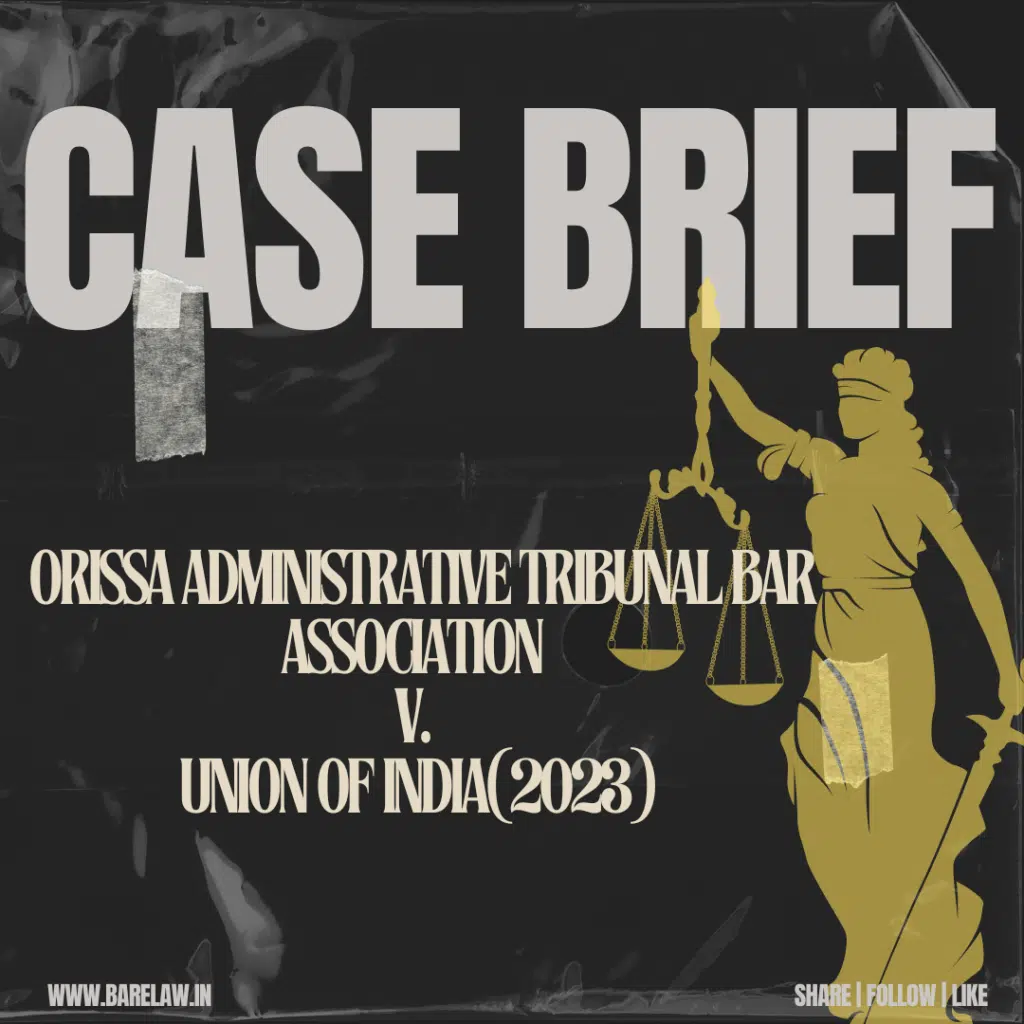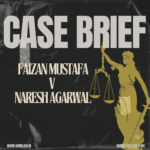
By Kirtana S Bhasita Kancherla
BALLB 2nd year
University School Of Law and Legal Studies,
Guru Gobind Singh Indraprastha University
CASE BRIEF| Orissa Administrative Tribunal Bar Association v. Union of India(2023)
| Citation | Bench | Court | Jurisdiction |
| 2023 SCC OnLine SC 309 | Dr D.Y Chandrachud, C.J. And Hima Kohli, J. | Before the honorable Supreme Court | Appellate Jurisdiction from Orissa High Court |
Table of Contents
Facts of the Case
- Part XIV-A of the Indian constitution was inserted by the parliament in the 42nd Amendment 1942. Part XIV-A talks about the establishment of tribunals for dealing with administrative and other sorts of disputes. There are majorly two articles under this part- Article 323A and Article 323B. Article 323A allows establishing administrative tribunals to resolve disagreements related to public services. These tribunals work on central level (CAT) and may work on state level(SAT). These tribunals have the authority to hear cases involving recruitment and similar kinds of issues related to public service. Article 323B Article 323B gives state legislatures the authority to establish tribunals to decide specific issues included in clause 2 of the article.
- The motive behind establishing tribunals was to reduce the burden of high courts and supreme court. CAT(Central Administrative Tribunal) was established under Section 4(1) of the Administrative Tribunals Act, to deal with employment conditional issues of All India Services. Similarly after considering the request of the state government, Section 4 (2) the Administrative Tribunals Act empowers the central government to establish the State Administrative Tribunal (SAT) at state level which has sole authority to deal with the conflicts of state level civil service employment conditions. For example issues related to remuneration, taxes, benefits etc. While Section 4(2) describes the establishment of SATs, it makes no mention of their cessation or abolition, and this is one of the main issues. Moreover, the SAT is not permitted to consider issues that are under the jurisdiction of the Central Administrative Tribunal (CAT). Section 29 transfers, immediately upon establishment, matters pending in other courts or agencies that would fall under SAT jurisdiction if the cause of action occurred after its inception. This includes state High Courts but excludes the Supreme Court.
- Orissa State Tribunal was established by the Central Government on July 4, 1986. In accordance with Article 323-A(2)(d) of the Indian Constitution, Section 28 of the Administrative Tribunals Act excluded the jurisdiction of all courts, except the Supreme Court or Industrial/Labour Courts, over matters within the domain of the Central Administrative Tribunal (CAT) and State Administrative Tribunals (SATs). Therefore, under Article 136, the only avenue for appeals from the Odisha Administrative Tribunal (OAT) to the Supreme Court was lost. This was altered, though, by the Supreme Court’s decision in “L. Chandra Kumar v. Union of India (1997),” which ruled that Section 28 of the Administrative Tribunals Act and related exclusionary clauses were unconstitutional because they restricted the authority of the Supreme Court under Article 32 and the High Courts under Articles 226 and 227.
- The L.Chandra Kumar case influenced Odisha, and the state requested the Union Government to abolish the Odisha Administrative Tribunal (OAT). The Chief secretary of the Odisha Government requested the central government to abolish the OAT as the primary purpose of the OAT to provide speedy justice was failing, as lengthy litigation resulted from OAT orders being appealed twice, first to the Orissa High Court and subsequently to the Supreme Court. On top of that, the Tribunal’s upkeep was very expensive and produced results that went against its initial objectives. Consequently, the State of Odisha proposed transferring pending OAT cases to the Orissa High Court. In January, 2016, the central government asked the Odisha government to collect the views of Orissa High court on the said proposal, HC agreed to this proposal. On 22 February 2019, the State of Odisha informed the Union Government that OAT employees would be reallocated to other government departments and confirmed that pending cases would be moved to the Orissa High Court. Oon 2 August 2019, the Union Government used Section 21 of the General Clauses Act to officially do so through Notification GSR 552(E).
- This act of abolishing OAT was further challenged by the appellants through a writ petition to which Orissa High Court replied by dismissing the argument of them. The high court did not find Article 323-A, section 4(2) of the Administrative Tribunals Act and The General Clauses Act’s Section 21 arbitrary and ensured that nothing prohibits these provisions to abolish the tribunals.
Issues
- Whether Article 323-A of the Constitution, which grants powers to the Central Government to establish State Administrative Tribunals, also grants it the authority to reverse the establishment and abolish the OAT?
- Whether Section 21 of the General Clauses Act can be used to revoke the notification establishing the OAT, leading to its abolition, if this conduct is unreasonable and in violation of Article 14 of the Constitution?
- Whether the Union and State Governments breached the principles of natural justice by not providing the OAT Bar Association and litigants with an opportunity to be heard before deciding to abolish the OAT?
- Whether the Union Government became functus officio after establishing the OAT?
Arguments
On behalf of the appellants, Learned counsels Mr. Ashok Panigrahi and Dr. Aman Hingorani led arguments. The intervenor in this appeal, Mr. C Ravichandran Iyer, Advocate-on-Record, joined them. Learned counsels argued that:
- Article 323A is in the nature of mandate. It gives the Union Government the authority to create SATs but not to remove them once they have been created.
- Section 21 of the General Clauses Act cannot be used to abolish State Administrative Tribunals (SATs), as the Administrative Tribunals Act does not grant such authority to the Union or State Governments.
- The State Government’s argument of less effective services was invalid. The Cuttack High Court only has one bench while the Orissa Administrative Tribunal (OAT) still has two ordinary and two circuit benches, It can be clearly implied that abolishment of the OAT will reduce people’s access to speedy justice drastically. This abolition violated the principles of natural justice as no consultation took place with OAT Bar Association or the appellants which violates the Article 14 of the Constitution. The OAT’s abolition expanded the Orissa High Court’s jurisdiction, which only Parliament can do.
- After establishing the OAT, the Union Government has no role in abolishing OAT as it became functus officio.
Mr Balbir Singh, the Additional Solicitor General and Mr. Ashok Kr Parija, learned Advocate General for the State of Odisha arguing from the side of Union of India and State of Odisha argued that
- Section 4(2) gives the central government power to establish tribunals on request of state governments and by using section 20 of the general clause act, the government may abolish SAT, without any requirement of amendment in the Constitution or the Administrative Tribunal Act.
- Since the cases have been sent to the Odisha High court, there is no question of violation of fundamental right to access justice.
- The State’s decision to abolish the Orissa Administrative Tribunal (OAT) was valid, the disposal rates of the OATs are low standing in the L. Chandra Kumar case. It would be wrong to say that there is no gain in abolishing OATs.
- The Orissa High Court’s decision to abolish the OAT does not violate natural justice. The fact that litigants must travel to Cuttack for court sessions remains intact. Financial help is provided through existing compensation systems to reduce plaintiffs’ obligations.
Judgment and reasoning by the court
- Maintainability of The Writ Petitions: The court held that writ petitions filed by the OAT Bar Association and the Odisha Retired Police Officers’ Welfare Association were maintainable under Article 226 . The court held that If a person can show that the impugned order in question is likely to harm their right based on a legislative provision, they have a right to come to the court. Such a person cannot be dismissed only because he lacks locus standi.
- Authority to Abolish Under 323-A: Article 323-A of the Indian Constitution allows establishing administrative tribunals to resolve disagreements related to public services. There was a discussion on the term “may” used in the article, where the court suggested that it is a permissive clause, allowing Parliament to make legislation to establish such tribunals. The law does not specify the conditions under which the authority must be utilized, and the legal and factual background do not suggest a requirement to establish tribunals. The provision’s goal is to eliminate arrears in High Courts and ensure timely resolution of service concerns, which can be accomplished through other ways. As a result, the clause is advisory and does not prohibit the Union Government from eliminating administrative tribunals after they are formed.
- Applicability of Section 21 of the General Clauses Act: The petitioners challenged the abolishment of OATs under section 21 of the GC act, which allows the union to revoke or make administrative orders. The court analyzed whether the act of abolishing OAT was administrative or quasi judicial because section 21 will be applicable only on the administrative acts not the quasi judicial ones. The court observed that the establishment and removal of OAT is an administrative task related to policy and as in the quasi judicial task there should be legal dispute involved with two parties to act judicially by it. The court also held that section 21 allows rescission when a law does not explicitly forbid it, which implies that the union had the power to abolish the tribunal. Also, the Court rejected the appellants’ assertion that abolishing the OAT would give the Orissa High Court new or expanded authority.The transfer of cases from the abolished Odisha Administrative Tribunal (OAT) to the High Court essentially restored things to their original condition, allowing the High Court to reclaim jurisdiction over the topics it had previously presided over. The Court further stated that the Union Government’s position on a legal matter in one instance does not preclude it from interpreting the law in another case.
- No violation of article 14 and principles of natural justice: The Supreme Court agreed with the Odisha government’s argument that the tribunal’s inefficiency in achieving speedy justice undermined the purpose for which it was established. Referring to the MPAT Abolition caseThe apex court held that abolishing the Odisha Administrative Tribunal (OAT) due to inefficiency was neither arbitrary nor unreasonable, and therefore did not violate Article 14. Consequently, the court concluded that the Odisha government’s decision to abolish the OAT was constitutionally valid. The court also rejected the argument of violation of natural justice, which states imposition of policy decisions on the stakeholders. The court referencing BALCO Employees’ Union (Regd.) v. Union of India said that it was practically not possible to consult every individual before changing any policy. A policy can be challenged if it violates the legal rights but not simply because it was not pre decisional hearing.
- Functus Officio Question: Black’s Law Dictionary defined functus officio as “Having fulfilled the function, discharged the office, or accomplished the purpose, and therefore of no further force or authority an instrument, power, agency, etc.” which has fulfilled the purpose of its creation, and is therefore of no further virtue or effect. The court held that the maxim will not apply on the administrative decisions and policies. Government has to be flexible at times and should be able to change the policies as society is subject to change and evolution. This doctrine cannot be applied to the government policies, as it would affect decision-making and freeze everything in place, from bus routes to major policies like education or healthcare. Hence, the government should be allowed to adjust and change their approach as needed, without being stagnant.
Final Ruling
The Supreme Court held the notification issued on 2 August 2019 abolishing the Odisha Administrative Tribunal (OAT) constitutional. It was held that abolishing OAT by the union government under 323A and Section 21 of the General Clauses Act is valid and not arbitrary in nature. No principle of Natural justice was harmed and article 14 has been violated.



